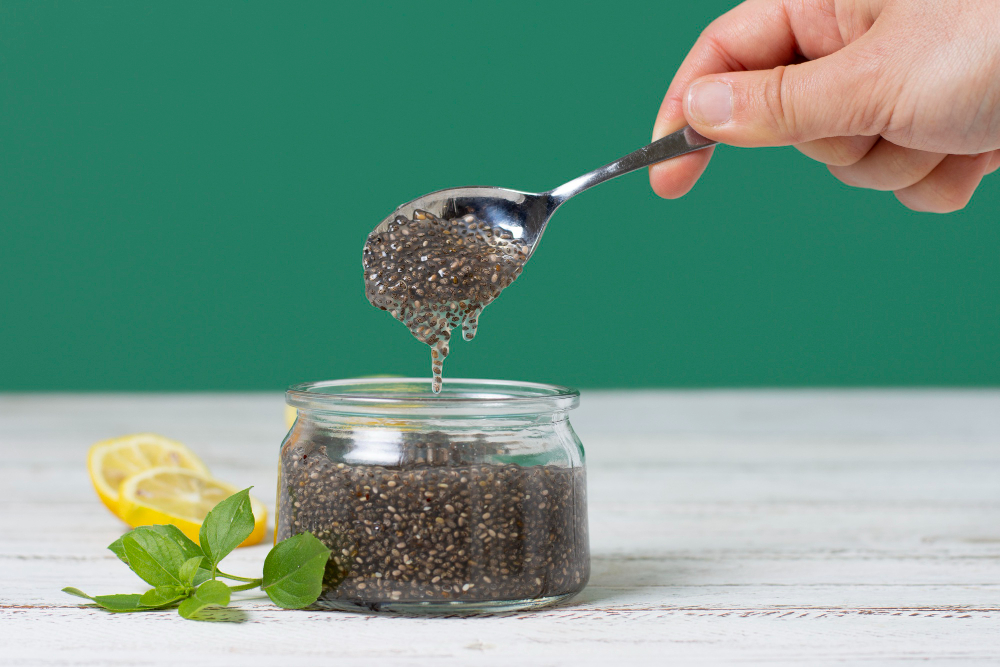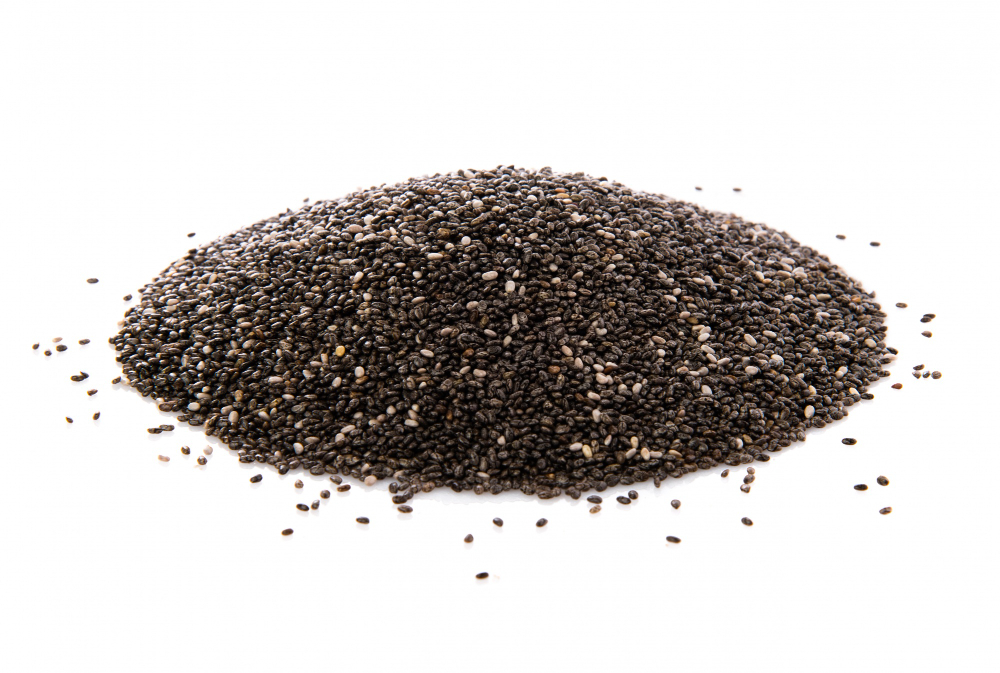Once a staple in the diet of ancient Aztecs and Mayans, chia seeds have taken over the world in recent times for being ultra nutritional. These small seeds earned kudos for being a “superfood” because they contained a high concentration of just about all the essentials for good health. From energetic boost, digestion enhancement to elevating your diet, chia seeds are an easy addition and very versatile.
This long review has mentioned a number of benefits of chia seeds, nutritional facts, side effects, and ways to easily add chia seeds into your daily routine. Later, we’ll delve deeper into the science of the health-enhancing properties of chia seeds and answer some of the most frequently asked questions: how many tablespoons are in an ounce, and what is chia seed good for?
What is chia seed?
Chia seeds derive from a perennial flower, otherwise known as Salvia hispanica, under classification of the mint family. Native to Central America, this plant has been consumed for many years and once in history was thought of as a superfood that granted energy. Chia just so happens to be the ancient Mayan word for the term “strength.” The seeds are in an oval shape and contain gray, black, and white spots and are about 1 mm in diameter.
They have a light, nutty taste and therefore can easily blend in with a great variety of foods. They can retain liquid and form a gel-like texture, so they are valued for thickening smoothies, puddings, and other recipes.
Chia Seeds Nutrition Facts
Chia seeds are considered a source of nutrition, actually. In one serving size-one ounce -of chia seeds, there has been:
| Nutrient | Amount |
|---|---|
| Calories | 138 |
| Protein | 4.7 grams |
| Fat | 8.7 grams |
| Omega-3 fatty acids | 5 grams |
| Carbohydrates | 12 grams |
| Fiber | 10.6 grams |
| Calcium | 18% RDI |
| Magnesium | 30% RDI |
| Phosphorus | 27% RDI |
| Zinc | 12% RDI |
| Vitamin B1 (thiamine) | 15% RDI |
| Vitamin B3 (niacin) | 16% RDI |
Antioxidants fill chia seeds inside along with some fundamental minerals like iron, potassium, and copper. At the same time, they are a super good source of plant-based Omega-3 fatty acids, which makes them, again, very appealing for both vegetarians and vegans.
Read More : Amazing Health Benefits of Green Apples
How Many Tablespoons in an Ounce?
One of the more common questions when measuring chia seeds is “how many tablespoons in an ounce?” Since an ounce of chia seeds weighs 28 grams, there are about 2 tablespoons of chia seeds in one ounce. This is a measurement that is important to understand, it helps show what an actual serving size is and what kind of nutrition you’re getting.
10 Advantages of Chia Seeds
Being Full of Nutrition
Chia seeds contain a host of vitamins and minerals, including calcium, magnesium, and Omega-3s. In fact, just one serving alone will give you a big percentage of what you need each day.
High in Antioxidants
Antioxidants in chia seeds have been found to neutralize free radicals within the body, helping to lower oxidative stress and inflammation. Results could be much healthier skin and a reduced chance of chronic diseases.
Excellent Source of Fiber
Chia seeds are rich in dietary fiber, with almost 11 grams in just a single ounce serving, and as such are an excellent inclusion to digestive health because they promote the regular and smooth passage of bowels. It ensures efficient elimination and hence the prevention of constipation.
Great for Heart Health
The omega-3 fatty acids contained in chia seeds-mostly ALA-can reduce inflammation and lower levels of cholesterol, both fairly significant to heart health.
Supports Weight Loss
Chia seeds are said to soak as much as 12 times their weight in water because they are rich in fiber. Thus, this fills one’s stomach for quite a long time; hence, generally speaking, less food is taken in and is beneficial considering weight loss.
Improved Bone Health
Three vital minerals that will make the bones their best are calcium, magnesium, and phosphorus-rich ingredients, and these include chia seeds.
Blood Sugar Level Stabilization:
It has also been recorded that chia seeds help in improving insulin sensitivity, hence regulating blood sugar levels and useful for patients suffering from or prone to type 2 diabetes.
Supports Gut Health
The rich fiber contained in chia seeds allows for good digestion and friendly gut bacteria toward overall gut health.
Improves Energy, Metabolism
Energy in the human body is derived from chia seeds because of the combination of proteins, healthy fats, and carbohydrates. Some athletes, because of this, use chia seeds to deliver the energy level during and after workouts by helping the body recover.
Healthy Skin
Antioxidants naturally balance out free radicals. The large quantities of antioxidants contained in the chia seeds act against aging and keep the skin much younger. Omega-3 fatty acids have been known to raise the skin hydration levels, reducing conditions related to skin diseases from inflammation.
Benefits of Chia Seeds for Females

They are also great for women in terms of bone health, hormonal balance, and weight management. Rich in calcium, they promote bone density-something quite important as women age. The omega-3s in chia seeds would help reduce inflammation that may ease PMS and menopausal symptoms.
Besides this, the fiber content in chia seeds helps one have good digestion and hence assists in maintaining healthy weight levels important for a balance in hormones. In pregnant persons, chia seeds will offer needed nutrition of Omega-3 and folate so greatly needed by the development stage of the fetus.
Read More : Impressive Benefits of Cloves: A Spice with Remarkable Health Perks
What Are Chia Seeds Good For?
Chia seeds are good for: Provide more energy and stamina due to their mix of carbohydrates, proteins, and healthy fats.
Digestive Health: These nuts have a great deal of fiber in them and hence help in digestion.
Lower Inflammation: The Omega – 3 fatty acids make up the deficiency within an individual’s body and help in lowering any form of inflammation.
Weight Loss: Owing to the nature of soaking the chia seeds, it helps people cut down on hunger and calorie intake.
Cardiovascular Health: These Omega-3 fatty acids and antioxidants support cardiovascular health by reducing any sort of inflammation in the heart.
Side Effects of Chia Seeds in Women
Chia seeds have a number of benefits; however, there are a number of side effects that need to be considered, especially for women.
Digestive Issues
With the high content of fiber in the chia seeds, a person may experience bloating, gas, and discomfort after intake of large quantities at one go. It is thereby advisable that one intakes the chia seeds with large volumes of water to ease digestion.
Risk of Low Blood Pressure
Omega-3 fatty acids contained in Chia seeds lower the blood pressure. Most parts are good but very problematic for those whose blood pressure’s already running low or for those on medication due to having low blood pressure.
Allergic Reactions
Some rare individuals may also be allergic to chia seeds: skin rashes, itchiness, and problems of a gastrointestinal nature. Once you first try the seeds, only consume a small amount and see how your body will react to them.
Blood Thinning
Omega-3s in chia seeds thin the blood and slow down blood clotting. In case you take blood-thinning medications like Coumadin or Warfarin you should consult your physician before adding chia seeds to your nutrition.
Adding Chia Seeds to Your Nutrition
Chia seeds are one of those foods whereby the possibilities are endless: on top of yogurt, being sprouted; blended into a smoothie; or stirred into oatmeal. Since chia seeds absorb water to an extent that it produces a gel-like consistency, they become especially useful and popular in thickening recipes such as chia pudding and overnight oats.
Following are some of the various ways you can get chia seeds integrated into your nutrition.
Chia Pudding: Mix the chia seeds in with almond milk into an overnight, stay-in-the-fridge mixture that comes out similar in texture to pudding for a delicious breakfast or snack option. Smoothie Booster: Mix in a tablespoon of chia seeds for an added boost of fiber and Omega-3 nutrients into your smoothie. Energy Bars: You can make your energy bars by combining chia seeds with nuts, fruits, and honey. Salad Toppings: Sprinkle chia seeds over the salad for that extra crunch along with the nutritious benefits.
Baking: Even adding chia seeds to muffins or bread extends into pancake mixes to provide a nutritious treat.
Conclusion
Chia seeds are one of those superfoods which will add variation and depth to your diet. Whether it be to stay on track with digestion, heart health, or weight, chia seeds are completely filled with health benefits. Like all other foods, though, moderation should be practiced and possible side effects noted, particularly for women. Once the chia seeds are a part of the daily consumption pattern, one will note that this minute size holds a powerful punch toward health and wellness.

